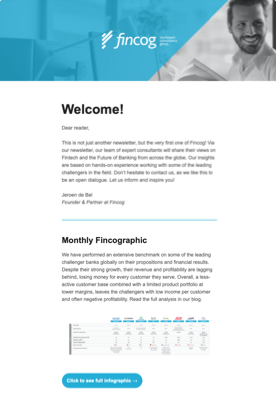As part of Fincog’s series of podcast for our Future of Banking report we spoke to Ali Niknam, from bunq. Our report outlines the recent trends and dynamics across markets and thereby provides an outlook on the future financial services market and how banks can best respond to the new reality of banking.
Ali is the Founder and CEO of bunq, a banking app that focuses on inclusivity and on what consumers and small businesses want. He shares with us his insights on the future of banking and the role of neo banks.
Q. What are the pain points you see in the markets and where would you like to make a difference?
Incumbent banks are very internally focused, with their users only coming into consideration at the end of the line. Whereas, for us it starts and ends with the user. We really look at what our users want and try to create products that they love to use.
Q. You're a fully digital native bank with a fully digital, technology driven mindset. Could you tell me about your approach to using technology and what it means when scaling to new markets?
Technology unlocks so many options and abilities that it is easy to get lost in it. I see that with colleagues, governments, etc., they try to make a list of features and requirements, and then try to optimize whatever technology or product they want to use. This usually ends up in tears, as technology just moves too fast. Incumbent banks are making mistakes by starting internally with processes and regulatory requirements and putting their customers at the end of the line. bunq are careful not to get carried away with all the possibilities that technology offers. We keep it simple by solving the tangible problems of our users. We are so technologically adept that we can apply whatever tech that will get us there in the easiest way possible.
Q. Your platform is very scalable in terms of expanding into new countries and adapting. This is something certainly not seen everywhere. Could you tell us anything about that?
We have automated so many things – continuous integration, continuous employment – which is very difficult to achieve even for non-banking companies. The approach we take towards tech has empowered us to be here, by keeping things as simple as possible. I always recommend that startups understand what their users expect from them and then calculate backwards. In many cases it doesn’t make sense to build for yourself, in some cases it does. It is not a dogmatic rule or law of physics as it depends on the situation, what your strengths and weaknesses are.
Q. Relating to the climate crisis, what can or should banks do and what is bunq doing?
This crisis affects us all but equally provides us with an opportunity to contribute. bunq has created a product that plants a tree for every 100 euros you spend and in doing so offsets your C02 footprint in about 2 years. This is a very elegant solution, it will not solve the climate crisis, but it is a meaningful contribution.
Q. With market turmoil and the social crisis in the east, you mentioned bunq is taking a lot of effort to help both sides of the equation. Could you expand your viewpoints and initiatives?
So, I am a co-founder of People for People – a foundation trying to help all the victims of this tragedy. What often happens with these things is that focus is on determining who is to blame, which side is right and which side is wrong. However, at the end of the day it is humans being impacted on both sides. bunq have always tried to stay neutral with aggressive language, and not be in a position that we must choose a side. We try to be there for the victims, it doesn’t matter what passport they have.
Q. I would like to wrap up saying that our report looks at the future of banking and how we can make banking better, so what are your views on the banking world of tomorrow and do incumbents have a place in this future?
I think neo banks will become banks and what banks are today will become dead. They are way past their due date. They are not efficient enough, they are not user-centric enough, they are too big, too political, I think they have had a good run. They have contributed a lot to society to bring us to where we are today, but now it is time for other new companies to take over and it is their time to shine.


